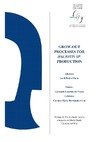Please use this identifier to cite or link to this item:
https://accedacris.ulpgc.es/jspui/handle/10553/74446
| DC Field | Value | Language |
|---|---|---|
| dc.contributor.advisor | Hernández Cruz, Carmen María | es |
| dc.contributor.advisor | Courtois De Vicose, Gercende | es |
| dc.contributor.author | Pedro Marín, Jordi | es |
| dc.date.accessioned | 2020-09-16T11:57:54Z | - |
| dc.date.available | 2020-09-16T11:57:54Z | - |
| dc.date.issued | 2020 | - |
| dc.identifier.uri | https://accedacris.ulpgc.es/handle/10553/74446 | - |
| dc.description.abstract | Aquaculture activities provides reliable marine food sources required by human population and a potential solution to the depletion of natural oceanic resources. Data indicate a steady increase of aquaculture production throughout the years, in comparison to the one originating from fisheries. World aquaculture production differs significantly between different regions. China being the world main aquaculture producer, while Europe, and other locations present significantly lower aquaculture production mainly due to environmental policies and sustainability concerns. Europe specifically, has developed advanced technologies to produce high quality marine products. Within Europe, Spain is located the sixth position in terms of fish production while it is the sixth biggest producer worldwide in terms of mussel production. A situation which confers to this country high level of aquaculture production diversification opportunities One species of interest that could confer another interest for aquaculture diversification is the European abalone Haliotis tuberculata sp. Abalone are mollusc species of high commercial value that also present interest due to the low environmental impact of their production. In abalone aquaculture, different techniques are currently employed in the context of grow-out processes being divided between land-based grow-out processes and sea-based grow-out processes. The first ones being more expensive but more reliables for research studies while seabased grow-out systems are often used for commercial production due to their economic and less energetic cost, although are more exposed to the environment. In both of these production systems abalone aquaculture specimens are fed by macroalgaes or compound feed, both strategies having advantages and disadvantages. Macroalgaes are abalone natural feed in the wild, they are an economic and a healthy strategy to feed abalones, but they don’t always cover all the nutritional requirements needed by abalone, while compound feeds can provide better and more tailored rnutritional values than algaes. However, compound feeds present to the eyes of the public opinion less healthy option in comparison with seaweeds. Innovate strategies such as IMTA systems have demonstrated their potential to increase macroalgaes nutritional values, enabling higher proteins content (the most value abalone component)in the algae, and consequently enabling quicker and better abalone develop while recirculate closed systems are presenting interesting opportunities for the future grow-out facilities. Both systems still require further development in order to become potential grow-out systems for aquaculture of interest for abalone aquaculture. | en_US |
| dc.language | eng | en_US |
| dc.subject | 251092 Acuicultura marina | en_US |
| dc.subject.other | Abalone | es |
| dc.subject.other | Haliotis sp. | es |
| dc.subject.other | Growth | es |
| dc.subject.other | Feed | es |
| dc.subject.other | Grow-out production | es |
| dc.subject.other | IMTA | es |
| dc.title | Grow-out processes for haliotis sp. production | es |
| dc.type | info:eu-repo/semantics/bachelorThesis | en_US |
| dc.type | BachelorThesis | en_US |
| dc.contributor.departamento | Departamento de Biología | es |
| dc.contributor.facultad | Facultad de Ciencias del Mar | en_US |
| dc.investigacion | Ciencias | en_US |
| dc.type2 | Trabajo final de grado | en_US |
| dc.utils.revision | Sí | en_US |
| dc.identifier.matricula | TFT-57200 | es |
| dc.identifier.ulpgc | Sí | en_US |
| dc.contributor.buulpgc | BU-BAS | es |
| dc.contributor.titulacion | Grado en Ciencias del Mar | es |
| item.grantfulltext | open | - |
| item.fulltext | Con texto completo | - |
| crisitem.advisor.dept | GIR ECOAQUA: Ecofisiología de Organismos Marinos | - |
| crisitem.advisor.dept | IU de Investigación en Acuicultura Sostenible y Ecosistemas Marinos (IU-Ecoaqua) | - |
| crisitem.advisor.dept | Departamento de Biología | - |
| crisitem.advisor.dept | GIR Grupo de Investigación en Acuicultura | - |
| crisitem.advisor.dept | IU de Investigación en Acuicultura Sostenible y Ecosistemas Marinos (IU-Ecoaqua) | - |
| Appears in Collections: | Trabajo final de grado | |
Page view(s)
189
checked on Jun 14, 2025
Download(s)
358
checked on Jun 14, 2025
Google ScholarTM
Check
Share
Export metadata
Items in accedaCRIS are protected by copyright, with all rights reserved, unless otherwise indicated.
